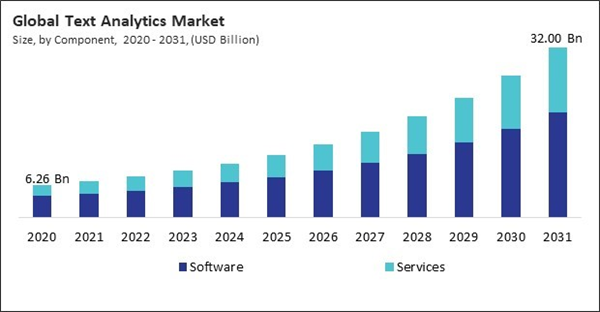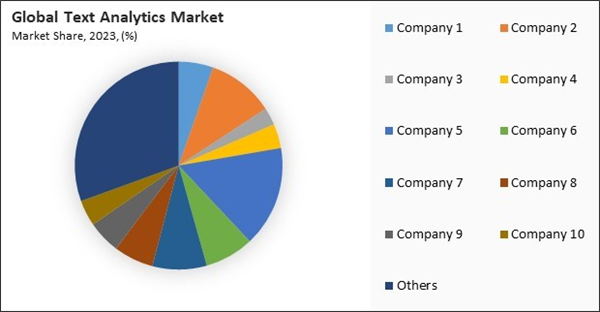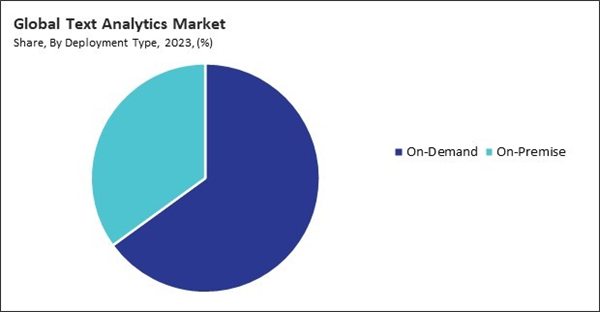The North America segment witnessed 41% revenue share in the market in 2023. The region's technological advancements and widespread adoption of analytics tools across industries drive the market. The presence of major players such as IBM, Microsoft, and Google has accelerated innovation, making cutting-edge text analytics solutions readily available. Industries like retail, BFSI, and healthcare extensively leverage these tools to analyze customer feedback, detect fraud, and ensure regulatory compliance.
The extensive utilization of social media and digital platforms has fundamentally changed the manner in which individuals and enterprises communicate, disseminate information, and engage with one another. With billions of users actively participating on platforms such as Facebook, Instagram, Twitter, LinkedIn, and TikTok, there has been an unprecedented surge in user-generated content. This content includes everything from reviews, comments, and tweets to blogs, videos, and discussion threads. Hence, the increased use of social media and digital platforms has amplified the volume of user-generated content and emphasized the importance of advanced tools like these analytics.
Additionally, Integrating Artificial Intelligence (AI) and Machine Learning (ML) into these analytics has revolutionized how organizations process and interpret textual data. One of the most notable improvements driven by AI and ML is in the domain of Natural Language Processing (NLP), which focuses on enabling machines to understand, interpret, and respond to human language meaningfully. NLP, powered by AI and ML, has significantly advanced in recent years, allowing these analytics tools to comprehend complex linguistic nuances, such as context, tone, and sentiment. Thus, adopting AI and ML in these analytics has increased its capabilities.
However, Analyzing textual data frequently involves handling sensitive and confidential information, such as customer feedback, emails, medical records, or financial data. Organizations must tread carefully to protect this data from breaches, misuse, or unauthorized access. Failure to do so can lead to significant legal and reputational consequences. For instance, compliance with stringent data protection regulations like the General Data Protection Regulation (GDPR) in Europe, the Health Insurance Portability and Accountability Act (HIPAA) in the United States, and the California Consumer Privacy Act (CCPA) are mandatory for businesses operating in respective jurisdictions. Hence, these challenges may hamper the growth of the market.
The leading players in the market are competing with diverse innovative offerings to remain competitive in the market. The above illustration shows the percentage of revenue shared by some of the leading companies in the market. The leading players of the market are adopting various strategies in order to cater demand coming from the different industries. The key developmental strategies in the market are Acquisitions, and Partnerships & Collaborations.
Driving and Restraining Factors
Drivers- Increased Use Of Social Media And Digital Platforms
- Rising Adoption Of Artificial Intelligence And Machine Learning
- Growing Use In E-Commerce And Retail
- Substantial Data Privacy And Security Concerns
- Lack Of Skilled Professionals
- Emergence Of Multilingual Text Analytics
- Rise Of Sentiment Analysis For Brand Management
- Significantly High Implementation Costs
- Complexity Of Natural Language And Quality Of Data
Component Outlook
Based on component, the market is bifurcated into software and services. The services segment procured 35% revenue share in the market in 2023. The complexity of setting up and maintaining advanced analytics systems often requires tailored services, including consulting, integration, and ongoing support. Managed services are in high demand as businesses outsource these tasks to specialized providers, ensuring their analytics systems remain efficient and up-to-date.Deployment Type Outlook
On the basis of deployment type, the market is divided into on-demand and on-premise. The on-premise segment garnered 35% revenue share in the market in 2023. In order to comply with strict data privacy and security regulations, businesses in highly regulated industries like government, healthcare, and finance usually prefer on-premise deployments. On-premise solutions offer the ability to store and process data within the organization’s infrastructure, reducing risks associated with data breaches or compliance violations.Enterprise Size Outlook
By enterprise size, the market is bifurcated into large enterprises and SMEs. The SMEs segment acquired 35% revenue share in the market in 2023. Small and medium-sized enterprises, often with limited resources, leverage text analytics to automate processes, gain customer insights, and improve decision-making. The availability of subscription-based models and pay-as-you-go pricing structures has made these tools accessible to SMEs, enabling them to compete with larger organizations.Industry Vertical Outlook
Based on industry vertical, the market is segmented into retail, BFSI, travel & hospitality, media & entertainment, healthcare, telecom & IT, and others. The BFSI segment witnessed 19% revenue share in the market in 2023. Financial institutions use text analytics to analyze transaction logs, customer complaints, and regulatory documents to identify potential fraud and ensure adherence to legal standards. For instance, banks leverage sentiment analysis to assess customer feedback and improve service quality, while insurers use text mining to detect anomalies in claims processing.Application Outlook
On the basis of application, the market is classified into customer experience, marketing, GRC, document management, workforce management, and others. The marketing segment acquired 22% revenue share in the market in 2023. Text analytics is widely used to analyze campaign performance, monitor brand sentiment, and track trends across social media platforms. By comprehending consumer preferences and behaviors, businesses are able to develop targeted advertisements, promotions, and content that effectively engage their audience.Regional Outlook
Region-wise, the market is analyzed across North America, Europe, Asia Pacific, and LAMEA. The Europe segment garnered 28% revenue share in the market in 2023. The implementation of stringent regulations such as the General Data Protection Regulation (GDPR) has driven the demand for text analytics solutions to monitor and manage compliance efficiently. Industries like BFSI, healthcare, and the government utilize these tools to ensure regulatory adherence and mitigate risks.List of Key Companies Profiled
- Qualtrics, LLC
- IBM Corporation
- Luminoso Technologies, Inc.
- Megaputer Intelligence, Inc.
- Microsoft Corporation
- Micro Focus International PLC (Open Text Corporation)
- Oracle Corporation
- SAP SE
- SAS Institute Inc.
- Averbis GmbH
Market Report Segmentation
By Component- Software
- Services
- Professional
- Managed
- On-Demand
- On-Premise
- Large Enterprises
- SMEs
- Retail
- BFSI
- Travel & Hospitality
- Media & Entertainment
- Healthcare
- IT & Telecom
- Other Industry Vertical
- Customer Experience
- Marketing
- GRC
- Document Management
- Workforce Management
- Other Application
- North America
- US
- Canada
- Mexico
- Rest of North America
- Europe
- Germany
- UK
- France
- Russia
- Spain
- Italy
- Rest of Europe
- Asia Pacific
- China
- Japan
- India
- South Korea
- Singapore
- Malaysia
- Rest of Asia Pacific
- LAMEA
- Brazil
- Argentina
- UAE
- Saudi Arabia
- South Africa
- Nigeria
- Rest of LAMEA
Table of Contents
Companies Mentioned
- Qualtrics, LLC
- IBM Corporation
- Luminoso Technologies, Inc.
- Megaputer Intelligence, Inc.
- Microsoft Corporation
- Micro Focus International PLC (Open Text Corporation)
- Oracle Corporation
- SAP SE
- SAS Institute Inc.
- Averbis GmbH











